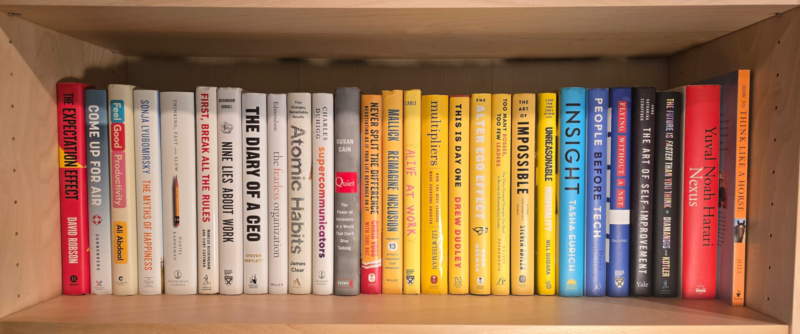The World is Looking for Generalists Who Understand How Disciplines Interconnect
Why generalists? In a world that often rewards specialization , one of the most underrated leadership superpowers is breadth of knowledge.
I do a fair amount of traveling to deliver training workshops for clients, and everywhere I go, I’m always excited to meet people in leadership roles who David Epstein, the author, has called ‘generalists.’ Epstein wrote one of my favorite books, Range: Why Generalists Triumph In A Specialized World.
The opening chapter is devoted to the difference between the origin stories and careers of two sports superstars: Tiger Woods and Roger Federer. Woods – a subject matter expert with a singular sports focus throughout his career. Federer – an athlete whose range of sports involvement before tennis was incredibly general.
Effective leadership today requires both depth and breadth of perspective.
Leaders today need to understand not only their domain but how it connects (and intersects) to others. They’re what we call generalists—and they’re the ones increasingly rising to the top.
If you’re an aspiring leader, this article might be your roadmap to becoming one of them!
What Is a Generalist?
A generalist is someone with a wide-ranging knowledge base, able to integrate ideas across fields, view systems as a whole, and lead in complex, cross-functional, and constantly changing environments.
They’re not “experts in everything.”
Instead, they’re skilled in understanding how everything fits together—and that’s what makes them so valuable in leadership.
Why Generalists Make Great Leaders
Leaders face ambiguity every day.
They don’t just solve problems in one area—they navigate challenges that cut across people, processes, and priorities.
That’s where generalists shine – they will:
- collaborate across functions with ease
- adapt quickly when the landscape shifts
- deliver a holistic view to decisions
- lead diverse teams by seeing and speaking to each member’s reality
Research backs this up. A 2023 report by O.C. Tanner showed that leaders with broad, cross-functional insight outperform those with narrower expertise, especially in times of change and uncertainty.
So, how can you start becoming a generalist?
5 Practical Ways to Build Your Breadth as an Aspiring Leader
1. Follow Your Curiosity
Natural curiosity is a tell-tale sign of a great generalist.
They read widely (as an example, I have included a photograph of one of my office bookshelves), ask numerous questions, and are constantly trying to understand how things work.
If you’re in finance, learn a bit about UX design. If you’re in HR, explore data analytics. You don’t need to master everything—just understanding the basics can spark new connections and ideas.
2. Take Cross-Functional Opportunities
Say yes to the project that puts you in a new space.
Volunteer for the task force that blends marketing and operations.
Get involved in customer-facing initiatives, even if you’re in the back office.
Some of the experiences that I now help our clients with have little to do with our core programs but more to do with opportunities that I seized throughout my career.
Leadership is about influence, and influence grows when you understand the world beyond your current role and particular viewpoint.
3. Think in Systems
Generalists zoom out.
They ask not just “What happened?” but “Why did it happen?” and “How does it affect everything else?” Train yourself to see patterns. Map out processes. Look for unintended consequences.
Leaders who think in systems can solve root problems, not just symptoms.
A couple of my favorite resources here are The FIFTH Discipline by Peter M. Senge and Thinking In Systems by Donella H. Meadows.
And, if you are a trainer or someone looking for some really cool exercises to get things done differently, a go-to of mine is The Systems Thinking Playbook by Linda Booth Sweeney and Dennis Meadows.
4. Flex Your Soft Skills in New Settings
Every team has its own culture and rhythm.
Generalists become fluent in navigating different work styles and personalities. Work with teams that challenge your comfort zone.
Practice adjusting your communication style. Discover how to be influential, even without decision-making power. A capacity for diverse emotions is key to effective leadership.
On that note, I am embarking shortly to study the art of working with some of our clients in a more profound and impactful way using the world’s most widely used personality assessment tool: The Myers-Briggs Type Indicator. (Stand by for more on that.)
5. Reflect, Integrate, Repeat
Breadth is less about the experience itself and more about how your experiences connect with one another.
Take time to reflect:
What have I learned from this project that applies elsewhere?
What new perspectives have I gained?
What themes keep showing up?
Generalists don’t just know more. They see more—because they connect the dots.
Don’t Wait for a Title to Lead
You don’t need a promotion to lead like a generalist.
Start now.
Learn something outside your comfort zone.
Seek diverse experiences.
Join conversations outside your department.
Connect the dots others aren’t connecting.
In a world that keeps changing, leaders who think like generalists will always be in
demand. And you can become one—by starting today!
Perhaps I can help you with some of my favourite quotes about the power of doing
something today.
“The journey of a thousand miles begins with a single step.” – Lao Tzu.
“The best time to plant a tree was 20 years ago. The second-best time is now.” –
Chinese Proverb.“The way to get started is to quit talking and begin doing.” – Walt Disney
“The purpose of life is to discover your gift. The meaning of life is to give your gift away.” – W.
Clement Stone“Start where you are. Use what you have. Do what you can.” – Arthur Ashe
“A year from now you may wish you had started today.” – Karen Lamb






